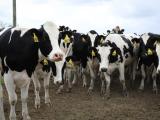Mar 21, 2006 (CIDRAP News) – Veterinarians could not give poultry the same antiviral drugs being stockpiled the world over to battle a human influenza pandemic, under a rule proposed yesterday by the US Food and Drug Administration (FDA).
The FDA is proposing to ban the extralabel use of adamantanes and neuraminidase inhibitors in poultry. Adamantanes (amantadine and rimantadine) and neuraminidase inhibitors (oseltamivir and zanamivir) are approved for treating influenza in people. Under the proposal, the rule would take effect Jun 20.
No drugs are approved to treat or prevent influenza in poultry, but the two classes of flu antivirals can be used legally for animals under the Animal Medicinal Drug Use Clarification Act of 1994, the FDA news release said. However, that law also allows FDA to prohibit certain extralabel uses in animals if they would pose a risk to human health.
"FDA has considered all available information and has concluded that the extralabel use of anti-influenza adamantane and neuraminidase inhibitor drugs in chickens, turkeys, and ducks presents a risk to public health," the FDA said. The agency added it could ban the use of those drugs in other animals as well.
The FDA is not aware of such use of antivirals in the United States, the news release said. However, international organizations have raised concerns about such activities, because they could lead to emergence of resistant strains of flu. Chinese farmers reportedly used amantadine on poultry in 2005, raising concerns about human resistance.
FDA is inviting comments on the proposed rule until May 22. (See news release link below for details on submitting comments.)
Meanwhile, the World Health Organization (WHO) on Mar 17 released details about the current recommendations for using oseltamivir (Tamiflu) to treat people for avian influenza. The statement contains little new information, but it underscores how little is known about the use of oseltamivir in human H5N1 cases, even though neuraminidase inhibitors are considered the best defense short of a vaccine.
"There is no direct clinical trial evidence that shows that oseltamivir is effective in human H5N1 disease because such studies have not yet been conducted," the WHO said. "Without such trials, the optimal dose and duration of oseltamvir treatment is uncertain in H5N1 disease and therefore doses of oseltamivir used for seasonal human influenza continue to be recommended."
The agency said prospective studies are "needed urgently" to determine the optimal oseltamivir regimen for human H5N1 disease. Severely ill patients might benefit from a longer or higher-dose regimen than is currently recommended, but there is no clear evidence at this point, the statement said. The standard treatment regimen for adults is 75 milligrams twice a day for 5 days.
The WHO also said studies are needed to better define the proper oseltamivir regimen for preventing H5N1 in people who have been exposed to the virus.
See also
FDA news release on the use of flu antivirals in poultry
http://www.fda.gov/NewsEvents/Newsroom/PressAnnouncements/2006/ucm108620.htm
WHO’s Mar 17 statement on use of oseltamivir
Jun 24, 2005, CIDRAP News story about China’s use of amantadine




















